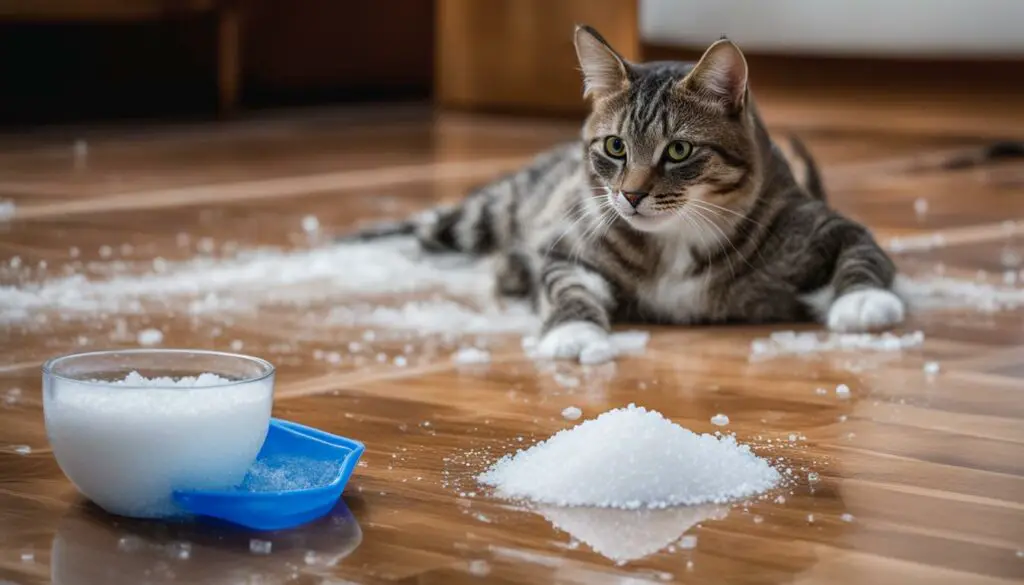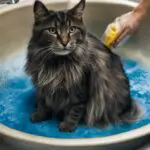As a cat owner, it’s important to be prepared for any unexpected situations that may arise. One such situation is if your cat accidentally ingests Epsom salt water. While this may sound concerning, there are steps you can take to ensure your cat’s health and safety. In this article, I will guide you through what to do if your cat drinks Epsom salt water and provide important information about the dangers of Epsom salt poisoning in cats. Stay calm and read on to learn how to handle this situation with care.
Key Takeaways:
- Magnesium toxicity can occur if your cat drinks Epsom salt water, leading to various symptoms.
- Cats can drink Epsom salt water, but ingesting too much can be harmful.
- If your cat exhibits symptoms of Epsom salt poisoning, seek immediate veterinary care.
- Contact your veterinarian for guidance on what steps to take if your cat ingests Epsom salt water.
- Prevention is key – store Epsom salt securely and out of reach of your cat to avoid accidental ingestion.
Can Cats Drink Epsom Salt Water?
Yes, cats can drink Epsom salt water. However, it’s important to understand the potential risks and considerations associated with this. While the Epsom salt in the water can be beneficial for cats’ overall health and wellness, it’s crucial to remember that cats process magnesium differently than humans do. Ingesting too much Epsom salt can lead to magnesium toxicity, which can cause various symptoms and health issues.
Cats require a specific balance of minerals in their bodies, and excessive magnesium can disrupt this balance. It’s always best to consult with a veterinarian before allowing your cat to drink Epsom salt water or any other substances that may affect their health.
To prevent any potential harm to your cat, it’s generally recommended to provide them with fresh water and a well-balanced diet that meets their nutritional needs. If you have any concerns or questions about your cat’s diet or health, it’s always best to seek professional advice from your veterinarian.
“While cats can drink Epsom salt water, it’s important to be cautious and considerate of their unique needs and sensitivities. Always consult with a veterinarian to ensure the safety and well-being of your feline companion.”
It’s essential to prioritize your cat’s health and safety above all else. While Epsom salt water may have potential benefits for humans, it’s always best to approach its usage with caution when it comes to our feline friends. Next, we’ll explore the dangers of Epsom salt poisoning in cats and the symptoms to be aware of.
Dangers of Epsom Salt Poisoning in Cats
When it comes to Epsom salt, many people are unaware of the potential dangers it poses to cats. Epsom salt, also known as magnesium sulfate, is commonly used for various purposes, such as a laxative or a muscle relaxant for humans. However, when ingested by cats in large amounts, it can lead to magnesium toxicity, which can have serious consequences for their health.
Cat owners should be aware of the symptoms of Epsom salt poisoning in cats, which include vomiting, diarrhea, dehydration, and even seizures. These symptoms can be alarming and require immediate action to prevent further complications. If you suspect that your cat has ingested a significant amount of Epsom salt, it is essential to contact your veterinarian right away.
It’s crucial to highlight that cats process magnesium differently than humans do. While Epsom salt can be beneficial for humans, cats are more sensitive to its effects. As a result, it is vital to keep Epsom salt and any products containing it, such as bath water or solutions, out of reach of your feline friends to prevent accidental ingestion.
The table below summarizes the dangers of Epsom salt poisoning in cats:
| Danger | Symptoms |
|---|---|
| Vomiting | Uncontrolled expulsion of stomach contents. |
| Diarrhea | Loose or watery stools. |
| Dehydration | Lack of water in the body, often resulting from excessive fluid loss. |
| Seizures | Uncontrolled electrical activity in the brain, leading to involuntary movements or loss of consciousness. |
It’s crucial to prioritize your cat’s safety by keeping Epsom salt and any products containing it securely stored away. If you suspect your cat may have ingested Epsom salt or is showing any symptoms of poisoning, do not hesitate to seek immediate veterinary care. Remember, prevention is always better than cure when it comes to protecting your furry companion’s well-being.
Symptoms of Epsom Salt Poisoning in Cats
Epsom salt poisoning in cats can lead to various symptoms that indicate potential toxicity. If you suspect your cat has ingested Epsom salt, it’s crucial to be aware of these signs and seek veterinary care immediately. Here are the common symptoms of Epsom salt poisoning in cats:
- Increased heart rate: Cats experiencing Epsom salt poisoning may have an elevated heart rate. It’s important to monitor their pulse and seek veterinary attention if it is significantly faster than normal.
- Vomiting and diarrhea: Digestive issues such as vomiting and diarrhea can occur as a result of Epsom salt toxicity. These symptoms can lead to dehydration and electrolyte imbalances, further complicating the cat’s health.
- Excessive thirst and increased urination: Cats with Epsom salt poisoning may display increased thirst and urination. This excessive fluid intake and output can be a sign of underlying toxicity.
- Seizures: In severe cases, Epsom salt poisoning can lead to seizures in cats. Seizures can be life-threatening and require immediate veterinary intervention.
If you notice any of these symptoms or suspect that your cat has ingested Epsom salt, contact your veterinarian for guidance and assistance. They will be able to provide the necessary care and treatment to mitigate the effects of Epsom salt poisoning and ensure your cat’s well-being.
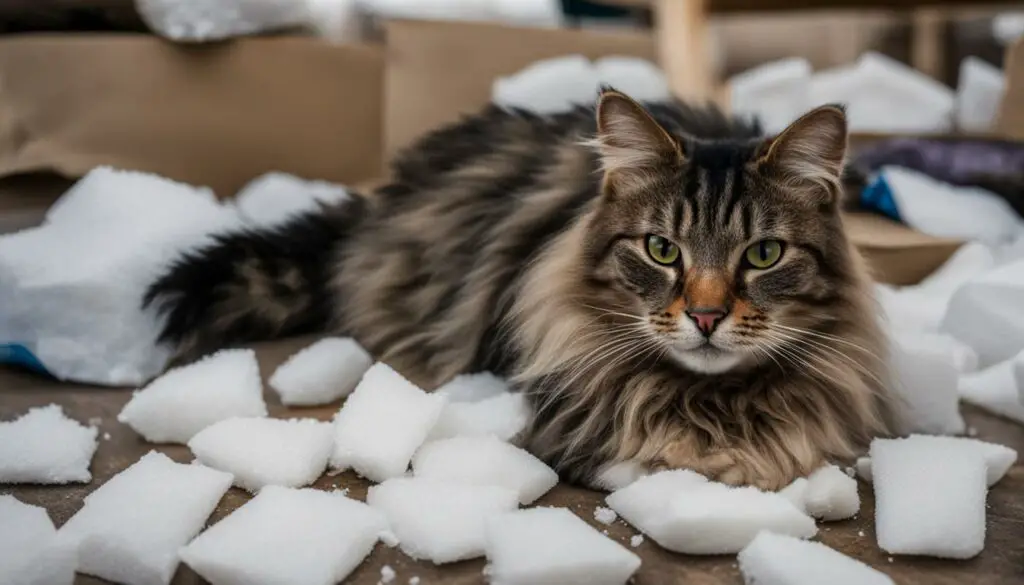
Table: Comparison of Epsom Salt Poisoning Symptoms in Cats and Humans
| Cats | Humans | |
|---|---|---|
| Increased Heart Rate | ✓ | ✓ |
| Vomiting and Diarrhea | ✓ | ✓ |
| Excessive Thirst and Increased Urination | ✓ | ✓ |
| Seizures | ✓ | ✓ |
What to Do If a Cat Drinks Epsom Salt Water
If you suspect that your cat has ingested Epsom salt water, it’s crucial to take immediate action to ensure their health and safety. Contact your veterinarian right away to seek professional guidance and assistance. They will provide the most accurate advice based on your specific situation. In the meantime, there are a few steps you can take:
- Do not induce vomiting: Unlike in some other situations, inducing vomiting may not be recommended in cases of Epsom salt ingestion. Always consult with your veterinarian first before attempting any home remedies.
- Keep your cat hydrated: Offer your cat fresh water to drink in order to dilute any potential toxins and help flush them out of their system. Ensure that clean water is readily available at all times.
- Monitor your cat’s symptoms: Keep a close eye on your cat and observe any changes or worsening of symptoms. Take note of any vomiting, diarrhea, increased thirst, or excessive urination. This information will be crucial for your veterinarian in assessing your cat’s condition.
Remember, it’s always best to consult with your veterinarian before taking any action. They will be able to provide the most accurate and tailored advice for your cat’s specific needs.
By seeking professional help and following their guidance, you can ensure the best possible outcome for your cat if they have ingested Epsom salt water. Your veterinarian will be able to offer appropriate treatment options to minimize any potential harm and address any complications that may arise.
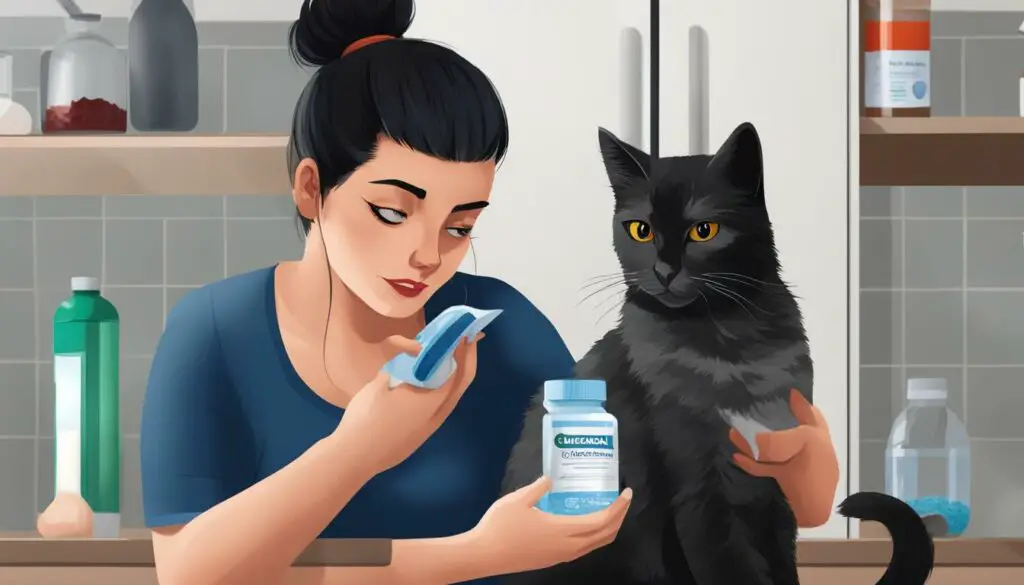
| Signs of Epsom Salt Poisoning in Cats | Actions to Take |
|---|---|
| Vomiting | Contact your veterinarian immediately for guidance. |
| Diarrhea | Keep your cat hydrated and watch for any signs of dehydration. |
| Increased thirst | Offer fresh water and monitor the amount of water your cat consumes. |
| Increased urination | Monitor the frequency and volume of your cat’s urination. |
| Seizures | Keep your cat in a quiet and safe environment and seek immediate veterinary care. |
Remember, prevention is always better than cure. Keep Epsom salt products securely stored and out of reach of your cat to minimize the risk of ingestion. By taking proactive steps to prevent access to Epsom salt water, you can help keep your furry friend safe and healthy.
Veterinarian for Cat Ingesting Epsom Salt Water
If you find yourself in a situation where your cat has ingested Epsom salt water, it is vital to consult with a veterinarian. Seeking professional veterinary care is crucial to ensure the health and well-being of your feline companion. A veterinarian will have the knowledge and expertise to assess the situation and provide appropriate guidance and treatment options.
When you contact a veterinarian regarding your cat ingesting Epsom salt water, they may recommend specific steps based on the severity of the situation. This could include inducing vomiting, administering activated charcoal, or suggesting other treatments to neutralize the effects of magnesium toxicity. It’s important to follow their advice and guidance to ensure the best possible outcome for your cat.
In addition to providing immediate care, a veterinarian can also offer valuable insights on preventing future incidents. They can advise you on how to safely store Epsom salt products and take necessary precautions to keep them out of your cat’s reach. Consulting a veterinarian will ensure that you have a comprehensive understanding of the risks associated with Epsom salt ingestion and the steps you can take to mitigate them.
Remember, the health and well-being of your cat should always be your top priority. If you suspect your cat has ingested Epsom salt water, don’t hesitate to reach out to a veterinarian for professional advice and assistance.
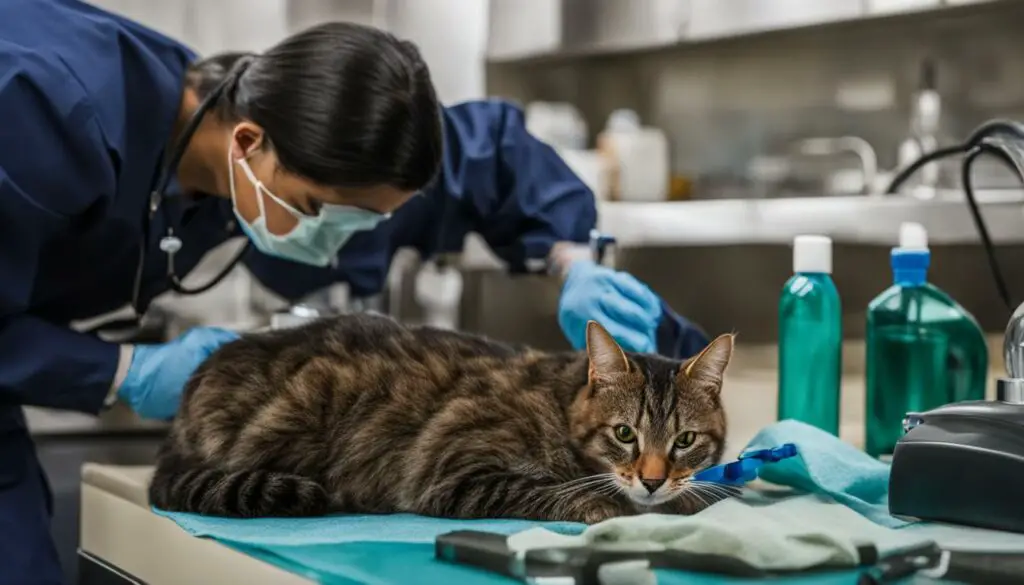
Table: Common Treatment Options for Cats Ingesting Epsom Salt Water
| Treatment Option | Description |
|---|---|
| Inducing Vomiting | A veterinarian may recommend inducing vomiting to remove the Epsom salt water from your cat’s system. |
| Activated Charcoal | Administering activated charcoal can help absorb the toxins in the Epsom salt water and prevent further absorption in the digestive system. |
| Fluid Therapy | Fluid therapy may be necessary to address dehydration caused by excessive urination resulting from Epsom salt ingestion. |
| Monitoring and Supportive Care | A veterinarian will closely monitor your cat’s condition and provide supportive care to manage any symptoms and prevent complications. |
| Preventive Measures | A veterinarian can offer guidance on how to prevent future incidents, including safe storage of Epsom salt products and creating a cat-friendly environment. |
Cat Health Emergency: Epsom Salt Ingestion
If your cat has ingested a large amount of Epsom salt, it is crucial to treat it as a cat health emergency. Epsom salt contains magnesium, which can be toxic to cats in excessive quantities. Immediate veterinary care is necessary to prevent further complications and ensure your cat’s well-being.
The symptoms of Epsom salt ingestion in cats can vary and may include increased heart rate, vomiting, diarrhea, excessive thirst, increased urination, and even seizures. If you notice any of these signs or suspect that your cat has ingested Epsom salt water, it is important to contact your veterinarian immediately.
“Immediate veterinary care is necessary to prevent further complications and ensure your cat’s well-being.”
When seeking veterinary care, your veterinarian may induce vomiting to remove the Epsom salt from your cat’s system or administer activated charcoal to absorb the toxins. They will assess the situation and provide appropriate treatment or recommendations based on your cat’s specific needs. Remember, only a professional can determine the best course of action for your cat’s health.
| Symptoms of Epsom Salt Ingestion | Actions to Take |
|---|---|
| Increased heart rate | Contact your veterinarian immediately |
| Vomiting | Seek veterinary care for assessment and treatment |
| Diarrhea | Do not delay in contacting your veterinarian |
| Excessive thirst | Follow your veterinarian’s instructions |
| Increased urination | Do not attempt to treat your cat at home |
| Seizures | Seek immediate veterinary care |
In conclusion, if your cat ingests Epsom salt water, it is imperative to treat it as a cat health emergency. The ingestion of a large amount of Epsom salt can lead to magnesium toxicity and severe consequences for your cat. Prompt veterinary care is necessary to address the potential health risks and provide appropriate treatment. Always prioritize the well-being of your feline friend and seek professional help in these situations.
Epsom Salt Water Toxicity in Cats
Epsom salt water can be toxic to cats if ingested in large amounts. The magnesium in Epsom salt can cause toxicity, leading to various symptoms and health issues. It is essential to prevent your cat from accessing Epsom salt water to avoid such toxicity.
If a cat drinks Epsom salt water, it can lead to magnesium toxicity, which can have severe consequences for their health. Some common symptoms of Epsom salt water toxicity in cats include increased heart rate, vomiting, diarrhea, excessive thirst, increased urination, and even seizures. It is important to recognize these symptoms and take immediate action to protect your cat’s well-being.
To prevent your cat from drinking Epsom salt water, it is crucial to store Epsom salt products securely and out of reach of your cat. Keep them in a cabinet or storage area that your cat cannot access. Additionally, be mindful of your cat’s environment and supervise them to ensure they do not accidentally come into contact with Epsom salt water.
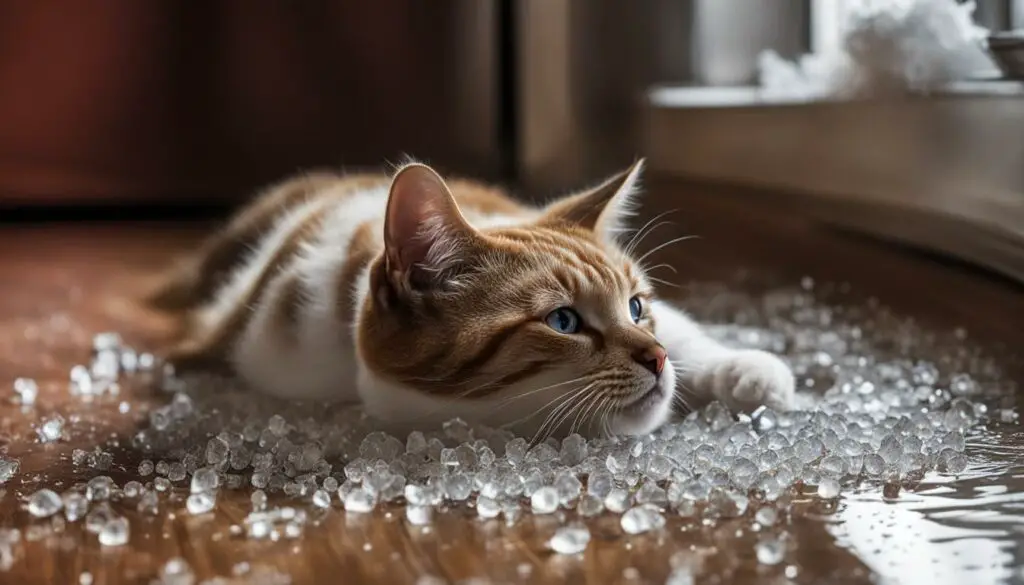
Preventing Cats from Drinking Epsom Salt Water
As responsible cat owners, it is crucial to take proactive measures to prevent our feline friends from drinking Epsom salt water. By following these simple steps, you can ensure the safety and well-being of your beloved pet:
- Secure storage: Store all Epsom salt products securely and out of reach of your cat. This includes keeping them in cabinets or high shelves that are inaccessible to your curious furry friend.
- Supervision: Always supervise your cat’s environment, especially when you are using Epsom salt for various purposes. Keep an eye on them to prevent any accidental ingestion.
- Create barriers: If necessary, create barriers or use childproof locks to restrict your cat’s access to certain areas where Epsom salt water might be present, such as bathrooms or gardens.
- Provide alternatives: Ensure that your cat has access to fresh, clean water at all times. By providing an appealing and readily available water source, you can reduce the likelihood of them seeking out Epsom salt water.
“Preventing cats from drinking Epsom salt water is crucial to their health and well-being. By implementing these preventive measures, you can minimize the risk of your cat ingesting harmful substances and protect them from the potential dangers of magnesium toxicity.”
Remember, prevention is always better than cure. By adopting these preventive measures, you can create a safe environment for your cat and ensure that they remain healthy and happy. If you have any concerns or suspect that your cat has ingested Epsom salt water, do not hesitate to contact your veterinarian for immediate guidance and support.
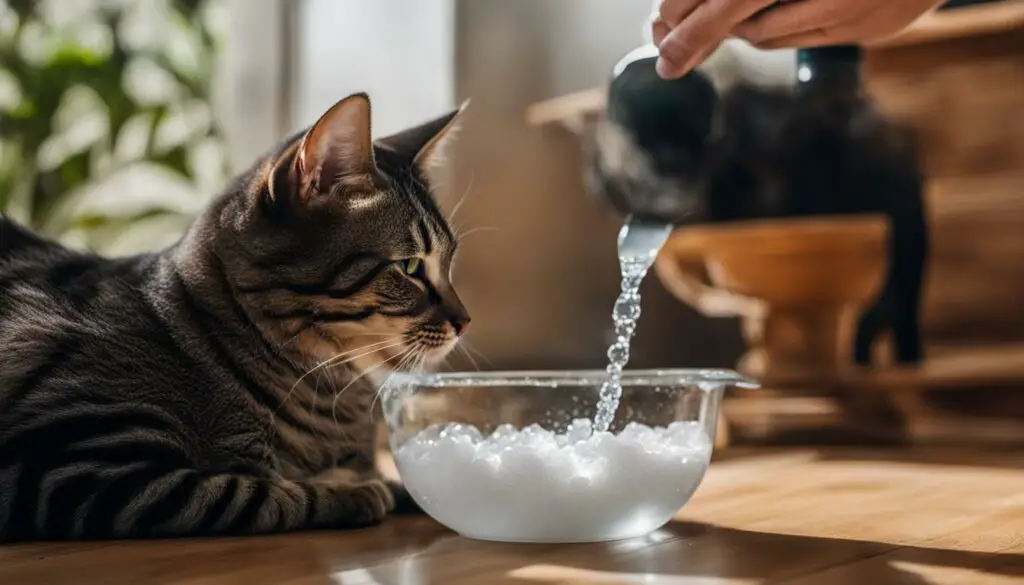
Using Epsom Salt Safely for Cats
While Epsom salt can have benefits for cats when used appropriately, it’s crucial to understand the proper usage and dosage to ensure the safety of your feline companion. Consulting with a veterinarian is essential before using Epsom salt for any purpose. Here are some guidelines for using Epsom salt safely for cats:
Bathing-Related Injuries
If your cat experiences bathing-related injuries, Epsom salt can be used as a soothing agent. However, it’s important to dilute the Epsom salt in water according to your veterinarian’s instructions. Gently apply the diluted solution to the affected area, taking care to avoid ingestion. Rinse thoroughly and monitor your cat’s response to ensure there are no adverse reactions.
Constipation Relief
In cases of constipation, your veterinarian may recommend the use of Epsom salt to help alleviate your cat’s discomfort. Again, it’s crucial to follow the prescribed dosage and dilution instructions. Administer the solution orally as directed by your veterinarian. Monitor your cat’s bowel movements and overall well-being during this time.
Supplementing Litter
In some instances, Epsom salt can be added to your cat’s litter to help address urinary tract issues and provide added magnesium. However, it’s important to introduce Epsom salt gradually and monitor your cat’s behavior and health. If you notice any changes or adverse reactions, discontinue use and consult your veterinarian.
Remember, using Epsom salt safely for cats requires professional guidance. Your veterinarian is best equipped to recommend appropriate usage and dosage based on your cat’s specific needs. Always prioritize your cat’s well-being and consult with your veterinarian before using any home remedies or supplements.
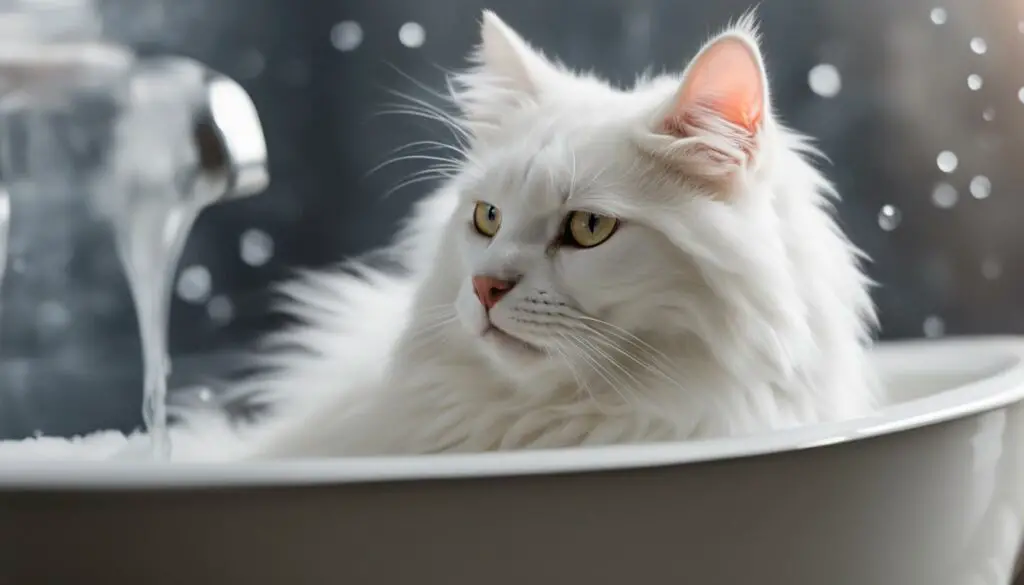
Epsom Salt for Cat Bathing
While Epsom salt is commonly used for various purposes, such as relieving muscle aches and promoting relaxation, it can also be beneficial for bathing cats under specific circumstances. However, it’s important to consult with your veterinarian before incorporating Epsom salt into your cat’s bathing routine to ensure it is safe and appropriate for their individual needs.
When used for bathing, Epsom salt can help address bathing-related injuries or discomfort that your cat may experience. It can also aid in relieving constipation in some cases. However, it’s crucial to follow proper dilution instructions and prevent your cat from ingesting the diluted Epsom salt water, as this can lead to magnesium toxicity.
When preparing an Epsom salt bath for your cat, follow your veterinarian’s guidance regarding the appropriate amount of Epsom salt to use based on your cat’s size and specific condition. Ensure the Epsom salt is completely dissolved in warm water before gently bathing your cat. Keep a close eye on your cat throughout the bathing process to ensure their comfort and safety.
Remember, while Epsom salt bathing can have potential benefits for cats, it’s always best to consult with your veterinarian to determine if it is suitable for your cat’s individual needs and to receive specific instructions on how to safely incorporate Epsom salt into their bathing routine.
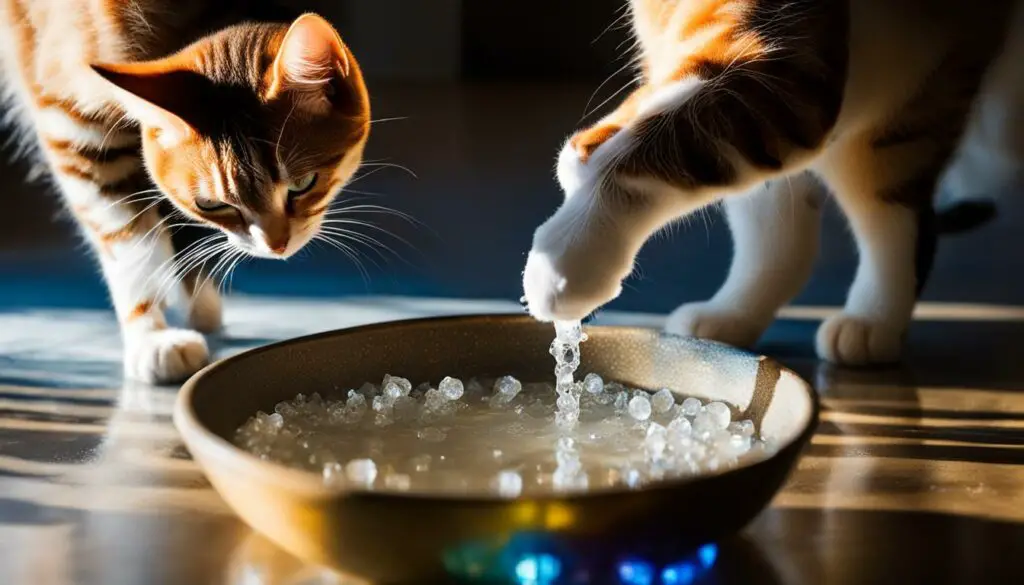
Cats and Epsom Salt Litter
Adding Epsom salt to your cat’s litter can provide several benefits for their health and well-being. The magnesium found in Epsom salt can help alleviate urinary tract issues and promote better overall urinary health in cats. However, it’s important to introduce Epsom salt to your cat’s litter gradually and monitor their behavior and well-being during the transition.
When incorporating Epsom salt into your cat’s litter, start by mixing a small amount of salt with their regular litter. Gradually increase the amount of Epsom salt over time, allowing your cat to acclimate to the changes. This gradual transition helps prevent any aversion or discomfort your cat may experience.
In addition to promoting urinary health, using Epsom salt in your cat’s litter can also help reduce odors and provide a smoother texture for their paws. The salt crystals can help absorb moisture and neutralize odors, keeping your cat’s litter box fresher for longer periods of time.
Remember that not all cats may tolerate Epsom salt in their litter, so it’s essential to monitor your cat’s behavior and overall well-being. If you notice any signs of discomfort or aversion, discontinue the use of Epsom salt in their litter and consult with your veterinarian for alternative solutions.
| Benefits of Epsom Salt in Cat Litter | Considerations |
|---|---|
| Improves urinary health | Monitor your cat’s behavior and adjust accordingly |
| Reduces litter box odors | Some cats may not tolerate Epsom salt |
| Provides a smoother texture | Consult with your veterinarian if any issues arise |
| Introduce Epsom salt gradually |
In conclusion, incorporating Epsom salt into your cat’s litter can offer several benefits for their urinary health and overall comfort. However, it’s crucial to introduce the salt gradually and carefully monitor your cat’s response. If you have any concerns or questions, consult with your veterinarian for personalized guidance.
Safety Precautions for Using Epsom Salt with Cats
When it comes to using Epsom salt with cats, it’s important to prioritize their safety and well-being. Here are some essential safety precautions to keep in mind:
- Dilution and Bathing: If you are using Epsom salt for bathing your cat, make sure to dilute it properly in water. Follow the instructions provided by your veterinarian to ensure the right concentration. Avoid using undiluted Epsom salt directly on your cat’s fur or skin, as it may cause irritation or dryness.
- Preventing Ingestion: Cats should never drink Epsom salt water, as it can lead to magnesium toxicity. To prevent accidental ingestion, ensure that your cat does not have access to the diluted Epsom salt water during bathing. Keep the bathing area secure and make sure to rinse your cat thoroughly with clean water to remove any traces of Epsom salt.
- Monitoring for Adverse Reactions: While Epsom salt is generally safe for cats when used appropriately, it’s important to monitor your cat for any adverse reactions. Keep an eye out for signs of skin irritation, itching, or discomfort during or after bathing. If you notice any unusual symptoms, consult your veterinarian for further guidance.
Epsom salt can be a useful tool for certain feline health concerns, but it should always be used cautiously and under the guidance of a veterinarian. Your veterinarian will be able to provide specific instructions and recommendations based on your cat’s unique needs and health condition.
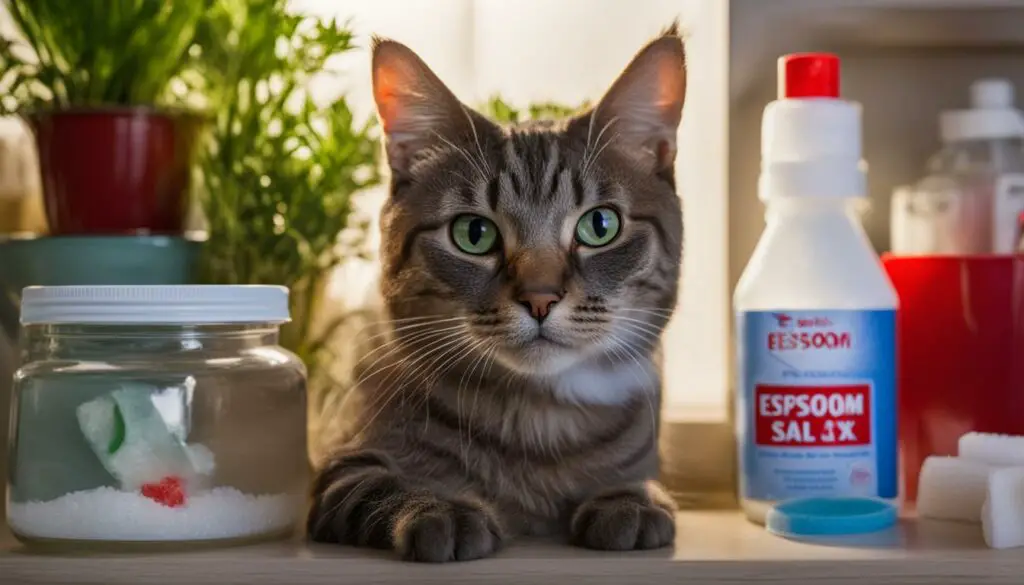
Effects of Cat Salt Poisoning and Treatment
When a cat ingests a significant amount of Epsom salt, it can lead to cat salt poisoning, which can have varying effects on their health. The severity of the symptoms depends on the amount ingested and the cat’s individual sensitivity. It’s important to be aware of the potential effects and seek proper treatment to ensure the well-being of your feline companion.
Cat salt poisoning can manifest in various ways, ranging from mild gastrointestinal issues to more severe complications. Some common symptoms include vomiting, diarrhea, excessive thirst, increased urination, and in severe cases, seizures. It’s crucial to monitor your cat for any signs of poisoning and take immediate action if necessary.
When a cat has ingested Epsom salt, treatment typically involves supportive care to manage the symptoms and prevent further complications. This may include administering intravenous fluids to address dehydration, medications to control vomiting or seizures, and close monitoring of the cat’s vital signs. It is important to consult a veterinarian for guidance as they can provide the appropriate treatment plan tailored to your cat’s specific needs.
Quote: “Immediate veterinary care is necessary to address the potential health risks associated with cat salt poisoning. The sooner the treatment is initiated, the better the chances of a positive outcome for your feline friend.”
It’s crucial to remember that prevention is the best approach when it comes to cat salt poisoning. By ensuring that Epsom salt and any products containing it are stored securely and out of your cat’s reach, you can minimize the risk of accidental ingestion. Additionally, promptly addressing any spills or leaks of Epsom salt water can help prevent your cat from accessing it. Regularly monitoring your cat’s environment and being cautious with the use of Epsom salt can go a long way in protecting their health and well-being.
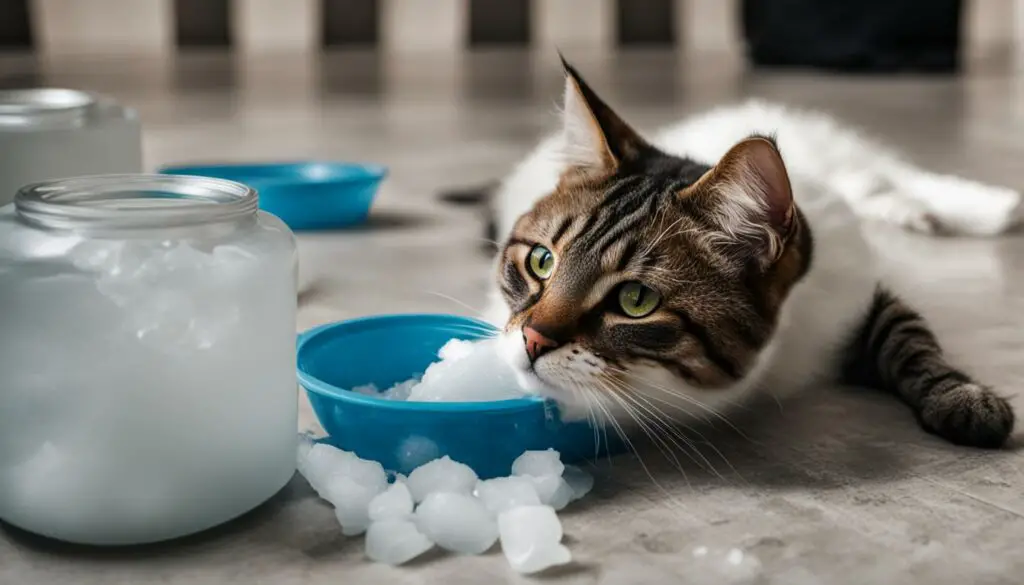
| Severity of Cat Salt Poisoning | Potential Effects |
|---|---|
| Mild | Gastrointestinal discomfort, such as vomiting and diarrhea |
| Moderate | Dehydration, increased thirst and urination, electrolyte imbalances |
| Severe | Seizures, tremors, cardiac abnormalities, kidney failure |
It’s essential to remember that cat salt poisoning can be a serious condition and should not be taken lightly. If you suspect your cat has ingested Epsom salt or is exhibiting any symptoms of poisoning, contact your veterinarian immediately for guidance and appropriate care. With prompt and proper treatment, many cats can recover from cat salt poisoning and regain their health.
Conclusion
In conclusion, the health and safety of our feline companions should always be a top priority. To prevent cats from drinking Epsom salt water, it’s important to store Epsom salt products securely and out of their reach. Additionally, supervising their environment can help avoid any accidental ingestion. By taking these precautions, we can protect our cats from the potential dangers of Epsom salt poisoning.
When it comes to using Epsom salt safely for cats, it’s crucial to consult with a veterinarian. They can provide guidance on the appropriate dosage and usage, ensuring the well-being of our furry friends. Whether it’s using Epsom salt for bathing-related injuries or supplementing their litter, professional advice is key to using this product safely and effectively.
Being aware of the symptoms of Epsom salt poisoning in cats is also essential. Increased heart rate, vomiting, diarrhea, excessive thirst, increased urination, and seizures are signs to watch out for. If any of these symptoms occur, seeking immediate veterinary care is crucial to prevent further complications.
By understanding the risks associated with Epsom salt and taking the necessary precautions, we can ensure the health and happiness of our beloved cats. So let’s keep them safe, keep them healthy, and continue to provide them with the love and care they deserve!
FAQ
Can cats drink Epsom salt water?
Yes, cats can drink Epsom salt water. However, ingesting too much can lead to magnesium toxicity.
What are the dangers of Epsom salt poisoning in cats?
Epsom salt poisoning can cause symptoms such as vomiting, diarrhea, dehydration, and seizures in cats.
What are the symptoms of Epsom salt poisoning in cats?
Symptoms of Epsom salt poisoning in cats may include increased heart rate, vomiting, diarrhea, excessive thirst, increased urination, and seizures.
What should I do if my cat drinks Epsom salt water?
If your cat drinks Epsom salt water, it’s important to contact your veterinarian immediately for guidance and potential treatment.
Should I take my cat to the veterinarian if it ingests Epsom salt water?
Yes, it is crucial to consult with a veterinarian if your cat ingests Epsom salt water. They can assess the situation and provide appropriate treatment or recommendations.
Is ingesting Epsom salt water a cat health emergency?
Ingesting a large amount of Epsom salt can be a cat health emergency, as it can lead to magnesium toxicity. Immediate veterinary care is necessary.
Can Epsom salt water be toxic to cats?
Yes, Epsom salt water can be toxic to cats if ingested in large amounts. The magnesium in Epsom salt can cause toxicity and various health issues.
How can I prevent my cat from drinking Epsom salt water?
To prevent your cat from drinking Epsom salt water, store Epsom salt products securely and out of reach of your cat. Supervise your cat’s environment to prevent accidental ingestion.
How can I use Epsom salt safely for cats?
When using Epsom salt with cats, it’s crucial to follow safety precautions, such as proper dilution for bathing and preventing your cat from drinking the water. Always consult with your veterinarian for specific instructions and guidelines.
Can I use Epsom salt for bathing my cat?
Yes, Epsom salt can be used for bathing cats, particularly for treating bathing-related injuries or constipation. Consult with your veterinarian before using Epsom salt for these purposes.
Can I use Epsom salt in my cat’s litter?
Yes, Epsom salt can be used as a supplement in your cat’s litter to help with urinary tract issues and provide additional magnesium. Introduce it gradually and monitor your cat’s behavior and well-being.
What safety precautions should I take when using Epsom salt with cats?
When using Epsom salt with cats, follow safety precautions such as proper dilution for bathing, preventing ingestion, and monitoring for adverse reactions. Consult with your veterinarian for specific instructions.
What are the effects of cat salt poisoning and how is it treated?
Effects of cat salt poisoning can vary, and treatment typically involves supportive care to manage symptoms and prevent further complications. Consult with a veterinarian for proper diagnosis and treatment.

